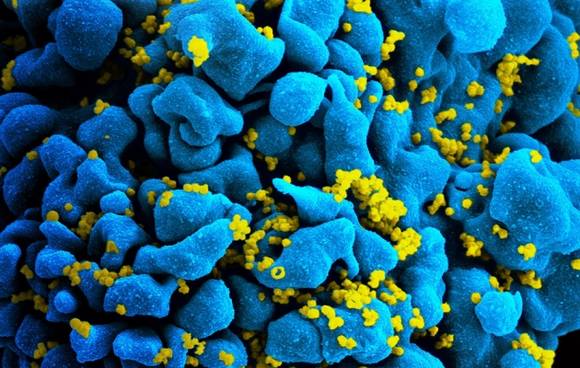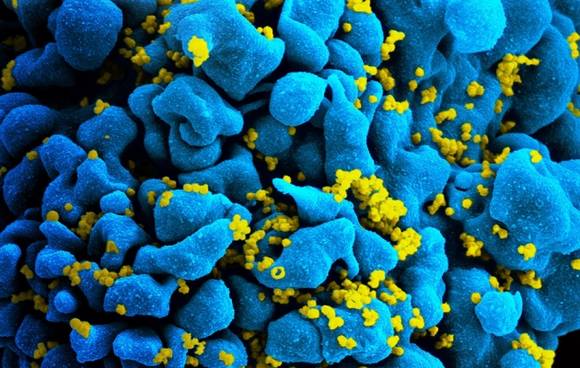
HIV를 항체를 가지고 치료하는 방법은 감염된 사람의 신체에서 바이러스의 수준을 줄이는데 도움을 주었으며 적어도 일정기간 동안 이러한 효과가 지속되었다고 <네이처>지에 보고했다. 수동적 면역화(passive immunization)로 불리는 이 접근법은 항체를 한 사람의 혈액에 퍼뜨리는 것이다. 지금까지 몇 차례에 걸친 인간을 대상으로 한 임상실험이 진행되었고 연구자들은 이 접근법이 HIV를 예방하고 치료하는데 도움을 줄 것이라고 기대하고 있다. 이번 연구는 이러한 목표를 이루기 위한 디딤돌 역할을 할 것이라고 미국 국립알레르기 및 전염병 연구소 (US National Institute of Allergy and Infectious Diseases)는 말했다. 그는 “이것은 초기 단계의 연구지만 수동적 면역화에 대한 연구”라고 말했다.
연구자들은 미국과 독일의 29명에게 3BNC117이라고 불리는 HIV항체를 네 가지 다른 양으로 나누어 테스트했다. 이들 환자들 중에서 17명은 HIV에 감염되어 있었으며 이들 중 15명은 테스트 당시에 항레트로(ARV) 바이러스 약물을 복용하지 않고 있었다. 많은 양의 항체를 받은 경우는 여덟 명에게 주어졌으며 28일 동안 혈액에서 바이러스양이 8배에서 250배까지 줄어들었다. 하지만 이 접근법이 장기적인 효과를 보이는지, 임상적으로 실질적인 효과가 있는지 여부를 확인하기 위한 테스트가 필요하다.
이전 연구는 비록 인간에서는 효과를 보이지 못했지만 수동적 면역화가 원숭이와 실험쥐의 혈액에서 HIV의 수준을 줄일 수 있었다. 하지만 이 초기 임상실험에서 사용된 항체는 많은 다른 HIV계통을 중립화시킬 수 없는 오래된 항체였다. 연구자들은 이 바이러스에 대해 좀 더 광범위하게 효과를 줄 수 있으며 ‘광범위하게 항체를 중립화할 수 있는’ 방안을 찾기 위해 지난 10년의 시간을 투자했으며 3BNC117 항체는 이러한 형태에 속한다.
이러한 접근을 이용한 치료법의 비용도 문제가 된다. 이들 항체는 한 번 치료를 위해서 수천 달러의 비용이 들어갈 것이며 HIV에 감염된 많은 사람들은 저임금이나 중간 임금국가에 살고 있으며 이들 중 일부는 이미 항체약물을 비싼 가격에 생산하려는 기업과 싸움을 시작했다. 뉴욕에 위치한 HIV예방을 위한 세계조직인 AVAC의 디렉터인 미첼 워런 (Mitchell Warren)은 “이 접근법의 실효성, 공공성 및 효율성에 대한 문제제기가 이루어지고 있다”고 말했다.
좀 더 향상된 항체를 이용한 접근법을 가지고도 연구자들은 성가신 문제에 직면해 있다: HIV는 인간신체에서 복제하면서 빠르게 돌연변이가 일어나고 있으며 시간이 지나면서 치료의 효율성을 줄일 수 있다. 이번 연구의 저자들은 단일항체를 테스트했다고 것은 사실이다. 많은 양의 3BNC117을 받은 두 사람에게서 이 항체는 28일간의 치료가 지난 후에 HIV를 중립화하는데 80% 정도 덜 효과적이었다. 아마도 이 바이러스는 항체를 피할 수 있도록 변화했기 때문일 것이다.
그 결과 단일 항체로는 HIV 환자를 치료할 수 없을 것이라고 이번 연구의 저자인 록펠러 대학의 전염병 전문의이며 면역학자인 미셸 누센츠바이그 (Michel Niussenzweig)는 말했다. 대신 복합항체 치료법을 사용했다. 누센츠바이그 연구팀은 두 번째 HIV 항체를 생산했으며 단일 항체와 3BNC117항체로 복합적인 형태로 테스트하기를 바라고 있다. 그는 이 면역치료법을 통해서 암치료법과 유사하게 사용해야 한다고 말하면서 “이번 연구의 목적은 일년의 한 번 예방을 위해 주사를 맞고 복합처방을 통해 치료할 수 있다”고 말했다.
복합항체에 의존하는 것은 수동면역화치료법의 비용을 높이게 된다. 하지만 워런은 과거 20년 동안 ARV 약물의 고비용을 줄이기 위해서 환자그룹과 이들에 대한 양보를 지적하는 딜브레이커(deal-breaker)가 아니라고 말했다. 그는 “일부 사람들은 10~15년 전에 ARV 가격이 떨어질 수 없을 것이라고 생각했다”고 말했다.
출처: <네이처> 2015년 4월 13일 (Nature doi:10.1038/nature.2015.17260)
원문참조:
Caskey, M. et al. Nature advance online publication http://dx.doi.org/10.1038/nature14411 (2015).
Trkola, A. et al. Nature Med. 11, 615–22 (2005).
http://www.nature.com/news/antibody-shows-promise-as-treatment-for-hiv-1.17260
Antibody shows promise as treatment for HIV
Clinical trial is encouraging first step to developing new approach to HIV prevention, treatment and cure.
Erika Check Hayden 08 April 2015
Article toolsRights & Permissions
NIAID

Antibody treatment reduced levels of HIV in study participants for 28 days.
Treating HIV with an antibody can reduce the levels of the virus in people's bodies — at least temporarily, scientists report on 8 April in Nature1.
The approach, called passive immunization, involves infusing antibodies into a person's blood. Several trials are under way in humans, and researchers hope that the approach could help to prevent, treat or even cure HIV. The work is a milestone towards those goals, says Anthony Fauci, director of the US National Institute of Allergy and Infectious Diseases in Bethesda, Maryland. “This is an early study, but it’s a study with some impressive results,” he says.
Researchers tested four different doses of an HIV antibody called 3BNC117 in 29 people in the United States and Germany. Seventeen of the participants had HIV, and 15 of those were not taking antiretroviral (ARV) drugs at the time of the study. One infusion of the highest dose of antibody, given to 8 participants, cut the amount of virus in their blood by between 8 and 250 times for 28 days.
Related stories
•Researchers see antibody evolve against HIV
•HIV trial under scrutiny
•Souped-up antibody fends off HIV
More related stories
But much work remains to determine whether the approach can produce longer-lasting effects and whether it is practical for clinical use.
Previous studies have shown that passive immunization can reduce levels of HIV in the blood of monkeys and mice, although the approach has not worked as well in humans2. But the antibodies used in those earlier clinical tests were of an older generation that could not neutralize many different strains of HIV. Researchers have spent much of the past decade trying to find 'broadly neutralizing' antibodies that are more widely effective against the virus, and the 3BNC117 antibody belongs to this class.
The price of treatment with this approach is also a concern. Antibodies can cost thousands of dollars for each course of treatment, and the majority of people with HIV are in low- and middle-income countries, some of which are already fighting drug companies over the high cost of antibody medicines. “The practicality, utility and efficacy of this approach are hugely open questions,” says Mitchell Warren, executive director of AVAC, a global organization that advocates HIV prevention and is headquartered in New York City.
Quick-change artist
Even with improved antibodies, researchers still face a vexing problem: HIV mutates quickly as it replicates in the human body, which can reduce the effectiveness of treatments over time. The study's authors found that this was true for the single antibody that they tested. In two people who received the highest dose of 3BNC117, the antibody became roughly 80% less effective at neutralizing HIV after 28 days of treatment — probably because the virus changed shape to evade the antibody.
As a result, it is unlikely that a single antibody alone could treat people who have HIV, says the study's lead author, Michel Nussenzweig, an infectious-disease physician and immunologist at the Rockefeller University in New York. Instead, therapies would use combinations of antibodies. Nussenzweig's group has produced a second HIV antibody and hopes to test it alone and in combination with 3BNC117 this year.
“The goal is a once-a-year shot for prevention and a combination approach for cure,” he says, adding that this immunotherapy approach to treating HIV would resemble treatments now used against cancer.
Relying on combinations of antibodies would raise the costs of passive-immunization treatments for HIV. But Warren says that this is not necessarily a deal-breaker, noting that patient advocacy and concessions by drug companies have helped to reduce the high cost of ARV medications over the past two decades. “Some people would have said 10–15 years ago that ARVs were not going to be affordable, either,” he adds.
